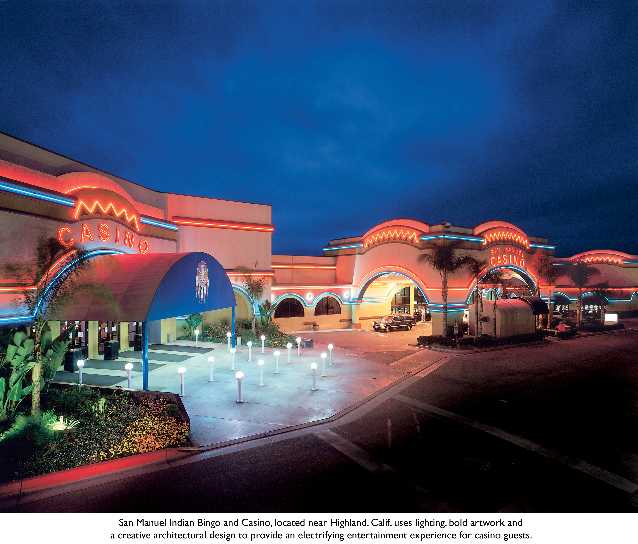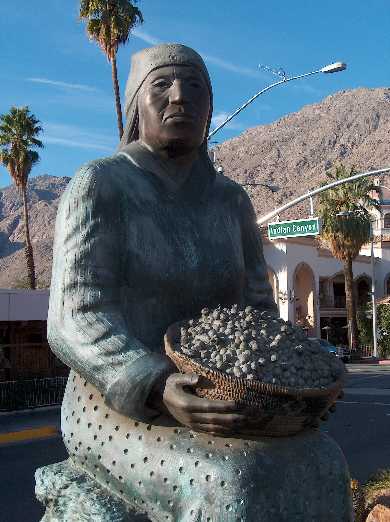 Another Stereotype of the Month entry:
Another Stereotype of the Month entry:
 Another Stereotype of the Month entry:
Another Stereotype of the Month entry:
September 29, 2004, 8:46 a.m.
Unintended Consequences
A damaging casino culture.
By Gary Bauer
Last week marked the historic opening of a museum on the national mall celebrating the diverse and deep culture of American Indian tribes. This recognition -- in our nation's capital -- of the first Americans corrects a glaring omission, and was long overdue. But the beauty of the new National Museum of the American Indian and all of its contents cannot conceal the appalling quality of life (or lack thereof) that continues to confront many Native Americans in this country.
Sixteen years ago, the U.S. Congress -- armed with good intentions -- passed the Indian Gaming Regulatory Act (IGRA), a law meant to spur economic opportunity and growth on poverty-stricken and remote Indian reservations. It was a law crafted to redress a history of indifference to the needs of generations of Native Americans who had lived without basic necessities, from health care to education to job opportunities.
The aim of IGRA was Indian empowerment, but the effort has badly missed its mark. IGRA has failed, and today, it might as well be renamed the "Law of Unintended Consequences."
Many of those who were meant to benefit from IGRA have not, and a shocking array of unintended beneficiaries have laid claim to the spoils of the system. More than a decade after the passage of IGRA, nearly a third of all Native American families with children live in poverty. The high-school dropout rate on reservations is more than three times the national average; the suicide rate is four times greater; and one in four Indians is an alcoholic by the age of 17.
Under IGRA, 224 tribes now operate 354 full-blown casinos in 30 states. The two biggest casinos in the world, Mohegan Sun and Foxwoods, in Connecticut, were both spawned by IGRA. This mushrooming of tribal gambling threatens to cast the United States as a "casino country," itself a far cry from the 1988 congressional vote many members believed was authorizing bingo parlors on remote tribal lands. Instead, the aggressive push to bring Indian "reservations" to heavily populated urban centers means that these gambling establishments will stand shoulder to shoulder with mainstream cultural destinations in our major cities. Slowly but surely, control over legalized gambling in this country is being handed over to tribes: In 23 states, tribes hold monopolies on Las Vegas-style casinos with slot machines and table games such as blackjack and roulette. Non-Indians are strictly prohibited from offering the same games.
The U.S. Supreme Court this month has an opportunity to finally put a stop to this particular unintended consequence, when it considers a case that asks: Is it a violation of the Constitution for states to grant race-exclusive industry monopolies to Indian tribes?
The petition to the high court was filed by four card clubs and two charities in the San Francisco Bay area -- operations that stand to be driven out of business by a nine-acre urban "reservation" conveniently created for an Indian tribe and its investors just off a major interstate near San Francisco.
Many people, including the U.S. Congress and Supreme Court who helped effectuate IGRA in 1988, might be shocked to see that the financial "winners" from Indian gambling include very few Indians. Rather, the "winners" are oftentimes savvy, non-Indian investors, large public casino-operating companies that manage operations for the tribes, and a handful of very wealthy Indians who are aggressively working to exclude other tribes from the action.
Take, for example, the case of Foxwoods. Chinese-Malaysian businessman Lim Goh Tong, who provided the up-front money to get the nation's largest casino started, will reportedly make at least a billion dollars over the life of his agreement with the Pequot Indians who are licensed to have the facility.
The windfall for these types of investors is the rule, not the exception, under IGRA. And what of the Indians who were intended to benefit from this system?

The bottom line is that while a small handful of tribes profit, others live in increasingly dire poverty. Exhibit A: The Oglala Sioux reservation in Pine Ridge, South Dakota, where unemployment in recent years has approached close to 90 percent and the school dropout rate is nearly 50 percent. Even with the Oglalas' Prairie Wind casino, the profits of which are supposed to support elderly and youth services, many tribe members endure cramped and squalid living conditions.
Apart from the Oglala example, on reservations across the country, unemployment hovers around 50 percent. And slightly more than 30 percent of working-age Indians in the U.S. are employed but living below the poverty line. Cronyism and corruption flourish on reservations where casino gambling has taken root, and the dreams of true economic and entrepreneurial opportunity have drifted away. The national poverty rate was 11.6 percent between 1999 and 2001; the poverty rate for residents of reservations, however, is 31.2 percent, and the national poverty rate for Native Americans is 24.5 percent.
Indians who speak out against the "casino culture" are intimidated, harassed, and even threatened. One member of the San Carlos Apache tribe in Arizona was ousted from the tribal council after her testimony of corruption led to the imprisonment of a former tribal leader involved with the casino. Other Indians boycotted her business and she received death threats.
According to a 2002 Time magazine report, casinos in the state of Connecticut, which is home to 0.1 percent of the U.S. Indian population, produced 15 percent of Indian gambling proceeds. Oklahoma, by contrast, is home to 35 percent of the U.S. Indian population, but, at the time of the 2002 report, was the source of only 2 percent of Indian gambling proceeds.
In other words, monetary benefits for Native Americans have been limited to only a few. In addition, David Yeagley of the University of Oklahoma, himself a Concoche Indian, points out that the idea of "money without labor is the fundamental flaw in the whole concept of the benefits that the gaming industry brings to Indian Country."
Indian gambling is not a case of a rising tide lifting all ships. It is a case of the undertow of greed washing the dreams and hopes of the truly needy back out to sea. In the name of fairness for both Indians and non-Indians, the time has come to draw the line on tribal gambling. We must look to the U.S. Supreme Court to rethink IGRA, and in so doing, restore fairness and sanity to a system that relies heavily on race-based quotas and phony presumptions -- a system that has led to an explosion in tribal gambling, headed to a neighborhood near you.
- Gary Bauer is the president of American Values.
Rob's reply
Gary Bauer is another right-winger who thinks only whites have the God-given right to get rich. He pretends to be outraged at the inequalities of Indian gaming, but what he really wants is for people like him to keep all the money. Let's take a look:
>> Last week marked the historic opening of museum on the national mall celebrating the diverse and deep culture of American Indian tribes. <<
That should be "cultures," not "culture." It doesn't quite make sense for one culture to be diverse.
Bauer starts off on the wrong foot and proceeds downhill from there.
>> The aim of IGRA was Indian empowerment, but the effort has badly missed its mark. <<
IGRA's aim was to empower those tribes interested in taking advantage of gaming opportunities. And those tribes unquestionably have benefited.
IGRA's aim was not to empower all tribes. Even if every tribe were forced to open a casino, many casinos would be in locations too remote to generate a profit.
Of course participation in Indian gaming is purely voluntarily. So how does Bauer think tribes that chose not to participate in gaming would empower themselves? Through some magical trickle-down effect? The tribes that did pursue gaming would give all the money they earned to the tribes that didn't pursue it?

Bauer's argument is nonsensical on the face of it. This is why you never hear critics like him explain why gaming hasn't "empowered" all tribes. There isn't an explanation because IGRA wasn't supposed to empower all tribes.
>> IGRA has failed <<
How does Bauer figure? The vast majority of tribes that have pursued gaming have demonstrably increased their economic prosperity. And again, Congress didn't intend IGRA to help tribes that didn't want to pursue gaming.
>> Many of those who were meant to benefit from IGRA have not <<
Bauer doesn't know what he's talking about. His vagueness is telling. Who are "those who were meant to benefit"? If Bauer thinks Congress intended to help every single Indian, let's see him quote that in the IGRA legislation.
>> More than a decade after the passage of IGRA, nearly a third of all Native American families with children live in poverty. <<
These problems persist because many tribes, such as the Lakota, haven't pursued large-scale gaming. What would be telling is the poverty, dropout, suicide, and alcoholic rates of the tribes that have chosen to pursue gaming. They and only they are beneficiaries of IGRA because they chose to seek its benefits.
>> This mushrooming of tribal gambling threatens to cast the United States as a "casino country," itself a far cry from the 1988 congressional vote many members believed was authorizing bingo parlors on remote tribal lands. <<
Most Indian casinos still are on tribal lands. I believe only three off-reservation casinos are presently in operation.
Whether those tribal lands are remote or not is another matter. But their boundaries haven't changed recently. If members of Congress didn't understand that tribes reside in places like Southern California and Connecticut, they were ignorant. Whose fault is it if they didn't know the basic geography of Indian Country?
>> Instead, the aggressive push to bring Indian "reservations" to heavily populated urban centers means that these gambling establishments will stand shoulder to shoulder with mainstream cultural destinations in our major cities. <<
The "pushes" may be aggressive, but they're limited in number and likely to fail. What Bauer meant to say is that "these gambling establishments may stand shoulder to shoulder," not that they will.
>> In 23 states, tribes hold monopolies on Las Vegas-style casinos with slot machines and table games such as blackjack and roulette. Non-Indians are strictly prohibited from offering the same games. <<
This is pretty ironic considering IGRA mandates that a tribe can operate only the type of games that are legal in its state. In other words, Bauer has it exactly backward.
And once again, he betrays his ignorance with a misleadingly passive sentence. "Non-Indians are strictly prohibited"...by whom? As it turns out, the only prohibitions are in the laws of each state. If state's legislators or voters want to overturn those laws and let non-Indians open casinos, they can.
Bauer tacitly acknowledges this when he notes that tribes in 23 states have monopolies. I don't know if this figure is correct, but let's assume it is. I believe tribes are conducting gaming in 48 states at present, so that means they don't have monopolies in 25 states. In other words, Indians don't enjoy a monopoly in the majority of states.
So "non-Indians are strictly prohibited"...only in the 23 states where voters have seen fit to let them keep their monopolies. Perfect case in point: California. There voters rejected Proposition 68, which would've opened gaming to non-Indian establishments.
So the American people are the ones who have strictly prohibited themselves from opening more casinos. That's called democracy in action. People don't let other people drive without a license or dangle a baby over a balcony. They also don't let others open a casino in their midst.
You see how Bauer has falsified the case against Indian gaming? Tricks like this are commonplace in the political arena.

The old race-based argument
>> Is it a violation of the Constitution for states to grant race-exclusive industry monopolies to Indian tribes? <<
If the Supreme Court considers such a case, one hopes it will rules the way lower courts have ruled: that Indian tribes are political entities, not racial entities. Meaning that their monopolies are not race-based or race-exclusive.
See Indian Rights = Special Rights for more on this issue.
>> Many people, including the U.S. Congress and Supreme Court who helped effectuate IGRA in 1988, might be shocked to see that the financial "winners" from Indian gambling include very few Indians. <<
Why exactly would they be shocked? Because the so-called failure of IGRA is such a big secret? Hardly.
Actually, Indian gaming is one of the most well-publicized issues in the political arena today. Many members of Congress are better versed in it than Bauer is. They've turned back every attempt to "reform" (i.e., gut) IGRA because they know it has worked for the tribes who have used it.
And do the "winners" really include very few Indians? In California alone, thousands upon thousands of Indians have lifted themselves out of poverty through gaming. If the non-Indian investors and employees in these casinos have benefited also...so what? These non-Indians would have to outnumber the Indians 50 or 100 to one for Bauer's statement to be accurate.
Even then, the correct phrase would be "relatively few," not "very few." Because, to reiterate the point, tens if not hundreds of thousands of Indians have benefited from Indian gaming. The fact that not every Indian has benefited is irrelevant since Indian gaming is voluntarily program.
>> Rather, the "winners" are oftentimes savvy, non-Indian investors, large public casino-operating companies that manage operations for the tribes, and handful of very wealthy Indians who are aggressively working to exclude other tribes from the action. <<
Since the management companies generally earn a percentage of the total take, they can't be "winning" unless the tribe is also winning. And although it's true a few wealthy Indians "are aggressively working to exclude other tribes from the action," the number is almost literally a handful. That is, an infinitesmal fraction of the 2.1-4.1 million people recognized as American Indians or Alaska Natives in the last census.
>> Chinese-Malaysian businessman Lim Goh Tong, who provided the up-front money to get the nation's largest casino started, will reportedly make at least billion dollars over the life of his agreement with the Pequot Indians who are licensed to have the facility.
Okay, let's take this case as an example. The question Bauer didn't ask is how much the hundreds of Pequot Indians will make over the life of the agreement. If they earn, say, $2 billion while Tong earns $1 billion, well, they're both winners.
Bauer's insinuation that non-Indians are somehow robbing Indians is patently false. In fact, people like Jeff Benedict and Brett Fromson have written books complaining about how the Pequots are getting rich unfairly. Both sides can't be right. If the Pequots are "winning," as these authors claim, Bauer's claim is false.
>> The windfall for these types of investors is the rule, not the exception, under IGRA. <<
A "windfall" implies they haven't earned the money. Bauer offers no evidence of this because there isn't (much) evidence. Investors like Tong have earned their return the way every venture capitalist does: by putting up money for a risky project.
Why is this necessary? Traditional banks wouldn't touch the early casino projects, so tribes had to turn to outside sources for funding. These sources were willing to offer large amounts of capital for greater rates of return.
>> And what of the Indians who were intended to benefit from this system? <<
They're benefiting, as even a cursory look at the facts will show.

>> The bottom line is that while small handful of tribes profit, others live in increasingly dire poverty. <<
Bauer admits this after scaring scared readers with talk of how "224 tribes now operate 354 full-blown casinos in 30 states" and "in 23 states, tribes hold monopolies on Las Vegas-style casinos." But despite all these casinos and all these (voter-approved) monopolies, only "small handful of tribes" are profiting? Then what exactly is the problem?
Bauer is trying to have it both ways and failing miserably. First he says tribes are taking over the casino industry and becoming multimillionaires. Then he says most casinos are unprofitable and most tribes are still poor. It can't be both, so which is it? And why is either result a threat to mainstream America?
>> Exhibit A: The Oglala Sioux reservation in Pine Ridge, South Dakota, where unemployment in recent years has approached close to 90 percent and the school dropout rate is nearly 50 percent. <<
Yes, that's Exhibit A for how Indian gaming hasn't helped those who haven't engaged in large-scale Indian gaming, all right.
>> Even with the Oglalas' Prairie Wind casino, the profits of which are supposed to support elderly and youth services, many tribe members endure cramped and squalid living conditions. <<
That casino is too far from major population center to earn much money. As is often the case with Indian casinos.
But who says it isn't contributing whatever profits it makes to support social services? And what outcome would Bauer have preferred? That the Oglala Lakotas open big casino near an urban center and rake in the big bucks? Or that they forgo gaming altogether and continue to be mired in poverty?
Bauer hasn't answered that question because there isn't a (good) answer. Fact is, this Lakota casino isn't much grander than the bingo parlors Bauer mentioned earlier. So is this the kind of establishment Congress intended to permit: a barely successful one?
Congress's goal for Indians: to remain poor?
Let's get this straight: Bauer thinks Congress intended to keep Indian casinos so small that tribes would remain poor? I'd love to read that in the IGRA legislation somewhere. No, Bauer doesn't know what he's talking about, as I've shown several times. His contradictory statements prove it.
>> Cronyism and corruption flourish on reservations where casino gambling has taken root <<
Cronyism and corruption are inherent in any tight-knit local government, as countless numbers of non-Indian towns and districts have proved.
>> and the dreams of true economic and entrepreneurial opportunity have drifted away. <<
They have? That explains why gaming tribes keep opening bigger and better casinos, as wells diversifying into hotels, ranches, bottling plants, and other businesses. Not.
>> Indians who speak out against the "casino culture" are intimidated, harassed, and even threatened. <<
In few cases, maybe. Which is just about what happens to whistle-blowers and other "trouble-makers" in any non-Indian business. No surprise there.
>> According to 2002 Time magazine report, casinos in the state of Connecticut, which is home to 0.1 percent of the U.S. Indian population, produced 15 percent of Indian gambling proceeds. <<
Nothing in IGRA says the proceeds from gaming should be evenly distributed among all the tribes. That's because, once again, Indian gaming is voluntarily.
If you compared Connecticut to Oklahoma in general, you'd find that residents of the former have a much higher per capita income than residents of the latter. So what does that tell us? That business in general is failing in Oklahoma? That we should redistribute Connecticut's wealth to Oklahoma to raise its residents out of poverty?
Sounds like "socialism" or a plan to me. Let's get right on it. If we can't have one tribe earning more than another, we certainly can't have one state earning more than another. Put everyone's income in a big pot and redistribute it equally to every American.

The Time magazine report was as bogus as this essay is. See Responses to TIME's Attack on Indian Gaming for details.
>> In other words, monetary benefits for Native Americans have been limited to only few. <<
Again the passive tense. Again careful readers are left to wonder. The "monetary benefits for Native Americans have been limited to only few"...by whom? Did Congress say the 300+ tribes that haven't pursued gaming can't pursue it? Are wealthy investors like Malaysia's Tong conspiring to keep gaming away from these 300+ tribes? Who's preventing the Navajo, the Lakota, and other major tribal groups from opening mega-profitable casinos? The world wants to know.
Is that what Bauer really wants: a casino on every reservation? Or what, exactly? You see how hopelessly muddled his "thinking" is.
My guess is that Bauer would prefer to repeal IGRA and have no tribes participate in gaming. That would eliminate the alleged unfairness and make all tribes poor again. If that isn't his solution, what is? Does anyone know?
>> In addition, David Yeagley of the University of Oklahoma, himself Concoche Indian, points out that the idea of "money without labor is the fundamental flaw in the whole concept of the benefits that the gaming industry brings to Indian Country." <<
And I point out that Yeagley is an ignoramus in Yeagley the Indian Apple.
P.S. "Concoche"? Try Comanche. That Bauer wrote "Concoche" without knowing it was a mistake is evidence that he's over his head.
Also note how he didn't refer to sovereignty, regulation, disenrollment, or Class III, among other commonplace terms. I'm guessing Bauer knows nothing about gaming and cribbed his screed from biased sources such as the Time rag report.
>> In the name of fairness for both Indians and non-Indians, the time has come to draw the line on tribal gambling. <<
"Draw the line"...where, exactly? Around the present Indian casinos, to keep gaming where it is and prevent further expansion? How would limiting expansion deal with the alleged inequalities between tribes? Doesn't that require that every tribe operate successful casino? Or that Congress mandate the redistribution of income from wealthy to poor tribes?
And if Congress does that, why limit it to gaming income? Why not redistribute income in every business sector and political entity from rich to poor?
>> We must look to the U.S. Supreme Court to rethink IGRA, and in so doing, restore fairness and sanity to system that relies heavily on race-based quotas and phony presumptions <<
What "race-based quotas"? Bauer hasn't offered evidence on any kind of quota, race-based or otherwise.
The ruling Bauer wants in the case he was talking about would allow non-Indians as wells Indians to operate casinos. That would spread the casino-generated greed, cronyism, and corruption throughout the nation. It would do nothing to address the alleged inequalities between tribes. It would drastically reduce the income at successful Indian casinos.
So my conclusion about Bauer is correct. He wants to put Indian casinos out of business so non-Indian casinos can corner all the gaming revenue. Indians should return to poverty and be thankful we didn't wipe them off the map. How dare they think themselves the equals of the good, honorable white men who run casinos in Las Vegas and Atlantic City?
I guess Bauer wants Indians to revert to complete dependence on the federal government. So is he advocating that the feds fully fund Indian programs and ensure that they benefit every Indian? In other words, is he advocating that the government guarantee that no Indian is left behind?
You can bet your bottom dollar he isn't. Bauer wants nothing of the sort. "Fairness" for him means non-Indians earn more and Indians earn less.
Related links
The facts about Indian gaming
|
. . . |

|
All material © copyright its original owners, except where noted.
Original text and pictures © copyright 2007 by Robert Schmidt.
Copyrighted material is posted under the Fair Use provision of the Copyright Act,
which allows copying for nonprofit educational uses including criticism and commentary.
Comments sent to the publisher become the property of Blue Corn Comics
and may be used in other postings without permission.